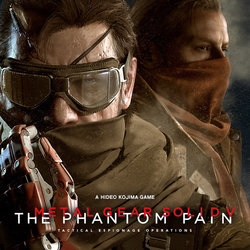
Facebook has said the allegations have no merit. The suit said the Silicon Valley company violated an Illinois biometric privacy law by harvesting facial data for Tag Suggestions from the photos of millions of users in the state without their permission and without telling them how long the data would be kept.
THE PHANTOM PAIN SOUNDTRACK WHEN EXFILTRATED SOFTWARE
The case stemmed from Facebook’s photo-labeling service, Tag Suggestions, which uses face-matching software to suggest the names of people in users’ photos. VPNs, you just rent some fibre and bang, job done.įacebook to pay $550m to settle facial recognition suit įacebook said on Wednesday that it had agreed to pay $550m to settle a class-action lawsuit over its use of facial recognition technology in Illinois, giving privacy groups a major victory that again raised questions about the social network’s data-mining practices. And so much more profitable than antivirus, which actually needs updates. The only reasons I can think of to use a VPN are a) you need to connect to a work network which demands point-to-point security or b) you’re in a country where you really don’t trust the government or c) you want to evade geoblocking to access some content.īut VPNs are the new antivirus – a great way for third-party suppliers to coin it. You’re not going to have your credit card details eavesdropped on public Wi-Fi.


As the EFF says, it’s nonsense (though they cleverly don’t mention VPNs or their advertising but I think the reason for their writing this message now is clear). This is why every time I’m listening to a podcast and hear an advert for a VPN which talks about “risks” and “credit cards” and “public Wi-Fi” I grind my teeth. You can cross “public Wi-Fi” off your list. There are plenty of things in life to worry about. With the widespread adoption of HTTPS, most major websites will be protected by the same encryption regardless of how you connect to them. In general, using public Wi-Fi is a lot safer than it was in the early days of the Internet. If that’s the case, it means the same information is commonly visible to the government whether they sniff it from the air or from the wires. …What about the risk of governments scooping up signals from “open” public Wi-Fi that has no password? Governments that surveill people on the Internet often do it by listening in on upstream data, at the core routers of broadband providers and mobile phone companies. Site owners started to take note and realized they needed to implement HTTPS (the more secure, encrypted version of HTTP) for every page on their site… Eric Butler released Firesheep, an easy-to-use demonstration of “sniffing” insecure HTTP to take over people’s accounts. However, starting in 2010 that all changed. Sites that used HTTPS on all pages were safe, but such sites were vanishingly rare.

This was widely accepted as a risk of using the Internet. They could also steal your passwords or your login cookies and impersonate you on your favorite sites. At that time, if someone could snoop on your network communications-for instance by sniffing packets from unencrypted Wi-Fi or by being the NSA-they could read your email. The advice stems from the early days of the Internet, when most communication was not encrypted. But now, due to the widespread deployment of HTTPS encryption on most popular websites, advice to avoid public Wi-Fi is mostly out of date and applicable to a lot fewer people than it once was. If you follow security on the Internet, you may have seen articles warning you to “beware of public Wi-Fi networks” in cafes, airports, hotels, and other public places. Why public Wi-Fi is a lot safer than you think You’ll need to click a confirmation link, so no spam.Ī selection of 11 links for you. You can sign up to receive each day’s Start Up post by email. CC-licensed photo by Richard Patterson on Flickr.

Do you really need one of these to protect yourself against “public Wi-Fi”? The EFF implies not.


 0 kommentar(er)
0 kommentar(er)
